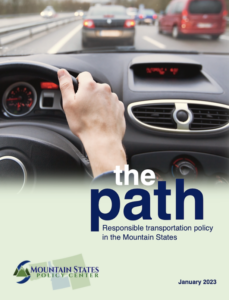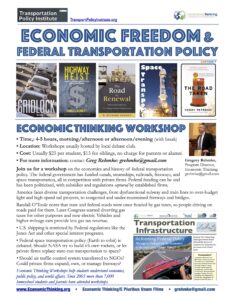Transportation Policy Reform
Transportation policies are local, state, federal. The coming year’s NCFCA topic calls for reforming federal transportation policies:
Resolved: The United States Federal Government (USFG) should significantly reform its domestic transportation policy implemented by the Department of Transportation (DOT).
What practical and Constitutional principles are there for federal transportation programs and policies? Roads, rivers, and rails cross state and international borders which involves the federal government policies.
The Mountain States Policy Center offers an overview of state and regional transportation policy reforms and goals: The Path – Responsible transportation policy in the Mountain States.
Freedom of mobility allows the public to travel wherever and however they choose with no – or minimal – restrictions. In recent decades, many public officials have waged campaigns to “discourage” certain modes, like cars, by implementing regressive tolling schemes, limiting parking, taking travel lanes away from drivers, and increasing traffic congestion to push people to other modes of transport or eliminate trips entirely.
State and federal transportation policies guide American travel by car, bus, train, sea, air, and even bicycle. Federal policies also regulate rocket transport to space. Unfortunately, many federal transportation policies are outdated, distort investments, increase risks, and add costs by preventing market-based innovations.
Key transportation economics concepts include opportunity cost, trade-offs, congestion-pricing, uncertainty, and entrepreneurship. No one knows or can know the best way for people or goods to travel from here to there. Entrepreneurs and enterprises innovate and invent new ways (Uber & Lyft, for example) helping make travel safer, faster, more convenient, and less expensive. Not all innovations are welcome: AirUber companies were blocked by the FAA (How the FAA Shot Down “Uber for Planes” FEE, 2016).
Many affirmative cases–some from past energy, agriculture, and ocean policy topics–are still significant problems and remain unsolved. Special or vested interests dominate state and federal transportation policy in part because few take the time, or have the motivation to research and communicate reform proposals to the public.
Debaters can market their skills to think tanks, industry associations, and give presentations to Rotary, Kiwanis and other business and community groups. Policy debaters are experienced (though young) transportation policy researchers and reform advocates.
Federal transportation policies ripe for reform include:
• Market reforms for ports and airports
• The Jones Act
• Highway Trust Fund/Mass Transit subsidies
• Transportation Safety Administration (TSA)
• Sunset Electric Vehicle mandates and subsidies
• Renewable Fuel Standards (Ethanol mandates and subsidies)
• Corporate Average Fuel Economy (CAFE) standards
• Congestion pricing for freeways
• End federal light-rail subsidies
Economic Thinking transportation policy posts will be updated and new one added. Study guide for past transportation topic is here (pdf).


